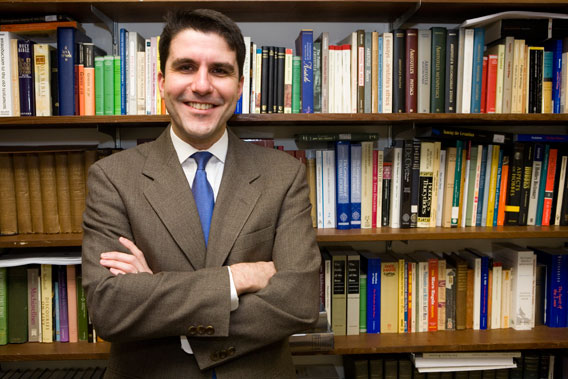The Enemy of My Enemy
In politics, it's easier to unite against a common foe than toward a common good
By Taylor McNeil
Some 65 years ago, the United States and the Soviet Union were sworn enemies. But as the Nazis rose to power in Germany, the two powers quickly cast aside their differences to fight a common enemy: Hitler. They became the Allies, and their allegiance helped win the war. But come peacetime, and the lack of a common foe, their natural enmity surfaced again, and the Cold War quickly heated up.

No political group is immune to the powerful effects of going negative, says Ioannis Evrigenis. Photo: Alonso Nichols
That's a pattern we should all be well aware of, says Ioannis Evrigenis, an assistant professor of political science, who sees it at work throughout human history. In his new book, Fear of Enemies and Collective Action (Cambridge University Press), he makes the point that political groups-all groups, in fact-need an enemy to oppose if they stand any chance of thriving-or even surviving. It might not be an optimistic point of view, but it's important for understanding everything from international relations to office politics.
"Once you experience it on any level, you see how powerful a focal point it provides for people to turn their attention," he says. Evrigenis calls it "negative association." While many groups come together for positive reasons, often there is an underlying negative feature to group identity. "One of the powerful aspects of this negative association is when you find this focal point, it enables you to transcend those barriers to collective actions. You might say, so and so and I have differences on any number of issues, but here we have found this one thing that can allow us momentarily to focus on some common endeavor."
Think of it this way: imagine you want to form a group that's interested in recycling. That's a positive association, Evrigenis might say, but there is an underlying negative, and that has to do with identity. "People everywhere define themselves as much by figuring out who they are as by finding out who they are not," he writes. Who they are not, in this case, are people tossing empty water bottles in the trash or driving Hummers.
Of course, it plays out on much larger scales, too. Nations often coalesce most strongly around fear of enemies. Consider this lineup of U.S. enemies from the last 70 years: Nazis, then Communists of many stripes and now terrorists. Remember that short interregnum starting in 1989, as the Cold War faded away, which some saw as an "end of history"? It didn't last long. In a blink, we had new enemies to keep us together.

In his book, Evrigenis tracks how thinkers from antiquity to the present day view negative association and fear of enemies, and their effects on states. While the circumstances they describe change, underlying factors-the need for enemies-usually remain the same.
When these enemies appear, the first reaction is to separate "us" from "them," and vilify opponents. "The depth and profundity of the challenge may also lead to scapegoating, xenophobia and excessive emergency powers," Evrigenis writes. "The extent, frequency and troubling nature of these effects are sad confirmations of the role that outsiders play in supplementing even the strongest and most positive collective identities. Most troubling of all, however, is the realization that no political group is immune to them."
Those in power often use the fear of enemies as a means to political domination. Evrigenis cites the case of the English civil war. "There the question is very similar to the question we've been facing in recent times," he says. "The king of England claimed the right to call an emergency and require the suspension of certain laws and request more money from Parliament." Parliament balked, and internal conflict raged.
"This struggle is one that is seen all the time. Of course, those who are in power will try to get more power," Evrigenis says. "And those who are on the receiving end of power will try to check those who are in power." And both sides use fear of their enemies to drive loyalty in their camps.
"You see cases where it's used intelligently, and you see cases in which it's misused," he says. "One of the interesting aspects of the war on terror-the most recent example-is this open-endedness, which is implied by the fact that the enemy has become fear itself, as [Michel de] Montaigne had predicted."
But there's an inherent danger of the external threat wearing thin. "It has to be the kind of thing that is focused enough to capture people's attention," says Evrigenis. Machiavelli noted that it's not something you can do every day. "If you do, it raises issues of credibility and believability and whether or not people are going to go along with what you ask them to do."
And it is definitely nothing new. Some 2,000 years ago, civil war often threatened Rome, but luckily there was a distraction: Carthage. For decades, rich and poor Romans put aside their differences to fight their common enemy across the Mediterranean. But when Rome finally vanquished its superpower rival, it turned out to be a Pyrrhic victory. Soon the empire turned upon itself, as groups that had set aside their mutual enmity were quickly at each other's throats. Far better if Rome had allowed Carthage to survive to fight another day, Roman historian Sallust wrote, but it was indeed too late. The decline of the empire inexorably began, all for lack of a common enemy.
Taylor McNeil can be reached at taylor.mcneil@tufts.edu.


